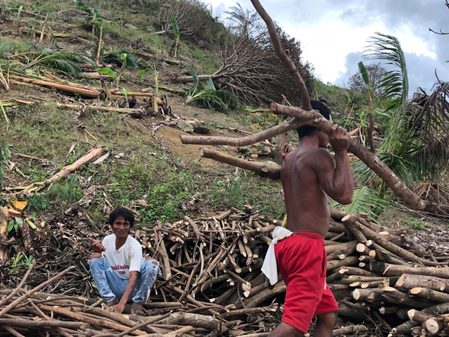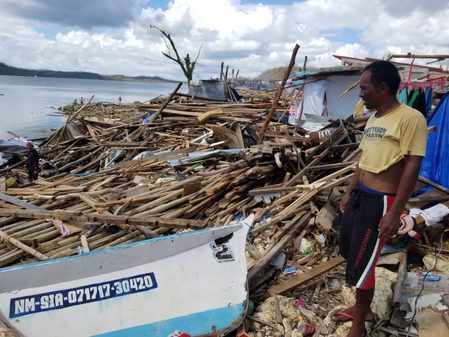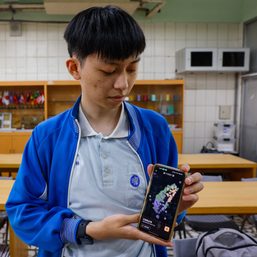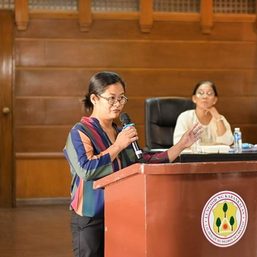SUMMARY
This is AI generated summarization, which may have errors. For context, always refer to the full article.
![[OPINION] Malacañang treats Odette aid woes with wrong diagnosis](https://www.rappler.com/tachyon/2022/01/media-odette-TL.jpg)
The Office of the Presidential Assistant for the Visayas’ (OPAV) wrong diagnosis on what ails Typhoon Odette disaster relief efforts only hurts hundreds of thousands of families struggling to recover from the typhoon.
“What are the badly-hit areas of Typhoon Odette that are not well-covered by the media?” screamed the first line of the agency’s call for aid, posted on the Facebook page of OPAV, which Secretary Michael Dino of Cebu heads.
The ALL CAPS header is a well-known trick by social media influencers and provocateurs. In most cases, the headline has little to do with the contents of a post.
The OPAV was dishonest in citing under-reporting as the main reason for delayed aid.
Local officials themselves told the Malacañang office how difficult access remains in these rural villages. OPAV’s staff never got to these areas; an executive assistant turned back up on a trip to Limasawa because of a landslide and a wonky tire.
The OPAV report came from various disaster risk reduction officials – the same folks already quoted in media reports citing the same figures of evacuees and damaged homes.
Journalists already reported first-hand from these areas, perhaps without the granular data of barangays without aid, but enough to give a clear scope of residents’ miseries.
Information is gold. It is oxygen to governance. But an administration more preoccupied with plotting to extend its power lifespan than serving the needs of a battered citizenry can easily transform it to dross.
OPAV could have reported on areas still awaiting aid and then asked specific agencies to deliver help, pronto, to communities in crisis. Its mandate, after all, is to bridge the gap between the Visayas and Malacañang by collaborating with line agencies, local governments, and communities.
Instead, it whined about media negligence, dodging the real question of why President Rodrigo Duterte’s Cabinet lacked timely information on critical needs or, worse, why even widely reported aid requests remained in limbo for weeks.
Odette swamped entire towns and toppled electric towers and thousands of poles. For days, government and private relief agencies and the media scrambled to grasp the extent of devastation. Provincial centers could not reach local chief executives. Trees, rocks, soil, and cement poles blocked roads.
From Siargao and Dinagat in Mindanao, Silago, Sipalay, and Ubay in the Visayas, all the way to Palawan, officials and residents waded for hours through mud and water, inching their way through on motorcycles, bangkas, and on foot, just to get their first scratchy messages out into the world.
Media reported that.
By December 18, the grim scale of destruction was apparent. Radio silence from the margins made that very clear.
Where local officials could be heard, they repeated the most urgent needs for weeks: road-clearing equipment and crews, the restoration of power and telecommunications signals.
Without these, they could not bring basic relief goods to the worst-hit areas.
Just before the New Year, Bohol Governor Arthur Yap was still urging the Energy Regulatory Commission and the Department of Energy to approve requests to tap into alternative sources of power. Officials of these agencies said the holidays made it hard to get signatures.
OPAV also ignored Duterte’s excuse: that the government was strapped for funds because of the COVID-19 pandemic, and that legal constraints prevented a release of funds until all reports of damage were in.
That’s only partly true. Congress gave Duterte billions of pesos to deal with the pandemic. In fact, the Commission on Audit reports on poor fiscal management of these emergency funds eventually led reporters to the Pharmally scandal.
The government has so much left over from the 2021 budget that Congress wants a law to extend its validity until the end of 2022.
Even without that law, the government isn’t exactly trapped in fiscal hell.
Institute for Leadership, Empowerment, and Democracy (I-LEAD) Executive Director Zy-za Nadine Suzara cites a November 2021 Department of Budget and Management report showing P6.5 billion available from the 2020 and 2021 NDRRMC funds.
Most funds were earmarked but not yet approved for release. That’s actually a pattern. A report by the Office of Civil Defense midway into 2021 said rehabilitation funds for Typhoons Quinta, Rolly, and Ulysses (2020) remained unused because national agencies were “still in the process of formulating the project proposals.”
The NDRRMC also traditionally reserves funds for strong year-end typhoons that enter from the southern Philippines and leave a wider path of destruction. Various agencies have Quick Response Funds, and there’s Duterte’s own Contingent Fund.
Some sectors saw malice in Duterte’s remarks. It’s more likely the President was just mouthing off again to curry sympathy and deflect blame. Typical of his administration, those statements were followed by the discovery of at least P10 billion available for Odette-hit areas.
This is symptomatic of a key problem in the Duterte government, which views governance through the prism of political exigency.
OPAV insults thousands of government personnel, civilians or part of state security agencies, and private aid volunteers who spent the holidays trying to penetrate to the worst-hit areas.
None of them mewled about needing news clips to find people in need. They all know the media is not a substitute for the government. – Rappler.com
Add a comment
How does this make you feel?







There are no comments yet. Add your comment to start the conversation.